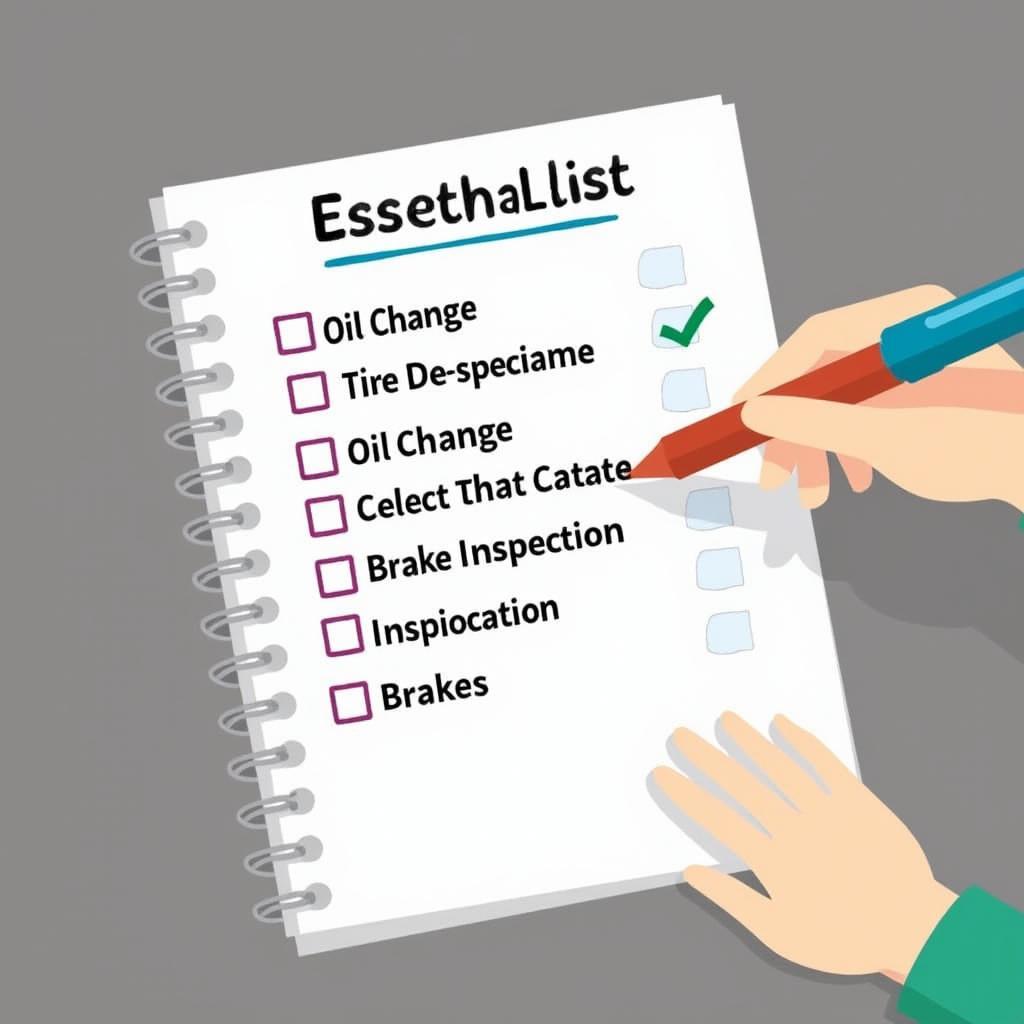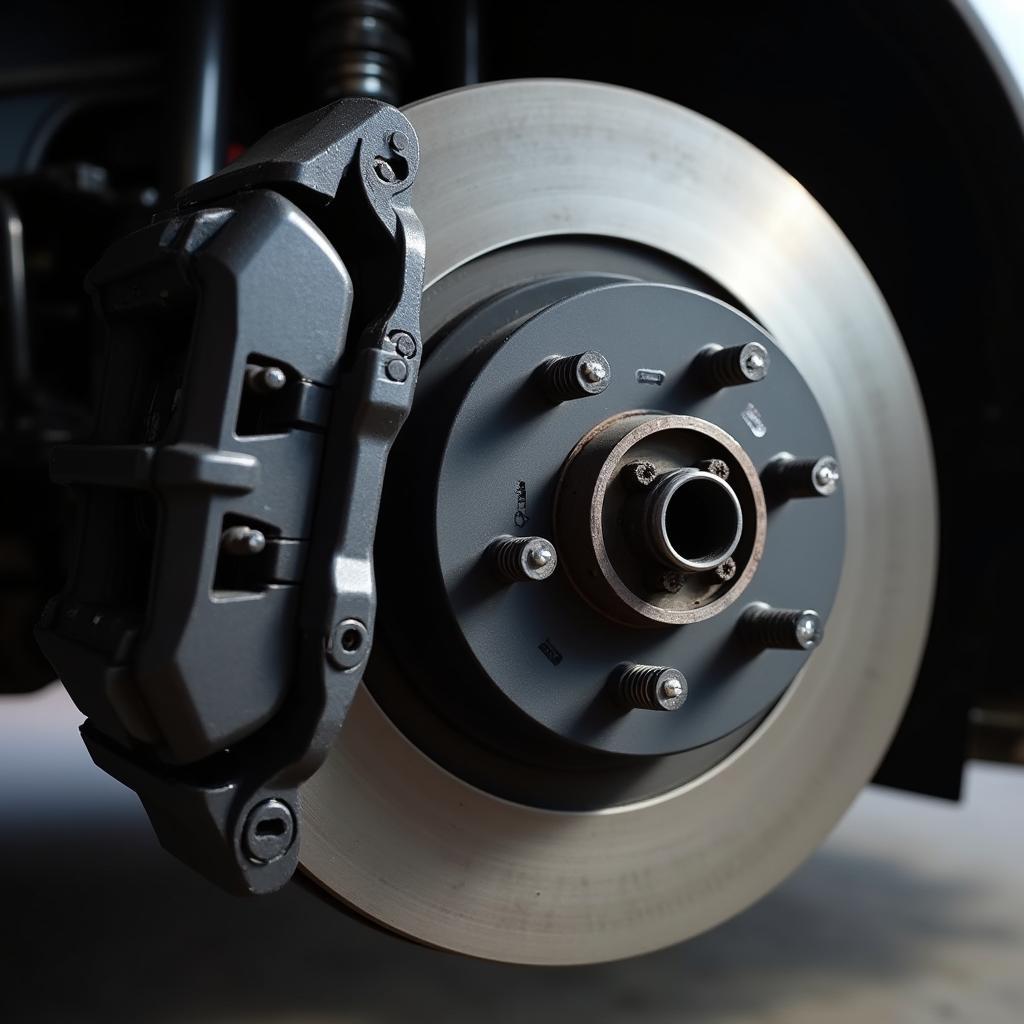Ensuring your car runs smoothly involves more than just filling up the tank. Regular auto car service is crucial for maintaining its performance, extending its lifespan, and avoiding costly breakdowns. This comprehensive guide will equip you with all the essential information you need to make informed decisions about your vehicle’s maintenance.
 Car Maintenance Checklist
Car Maintenance Checklist
Understanding the Importance of Regular Auto Car Service
Just like our bodies need regular checkups, cars require routine maintenance to prevent small issues from escalating into major problems. Neglecting car maintenance can lead to:
- Reduced fuel efficiency: Worn-out parts, such as spark plugs and air filters, can significantly decrease your car’s mileage.
- Compromised safety: Faulty brakes, worn tires, and malfunctioning lights pose significant safety risks to you and other drivers on the road.
- Costly repairs: Ignoring minor issues can lead to major component failures, resulting in expensive repairs that could have been avoided with regular servicing.
- Decreased lifespan of your vehicle: Consistent car care ensures all components work harmoniously, prolonging the life of your vehicle.
What Does Auto Car Service Encompass?
Auto car service encompasses a wide range of services that vary depending on your car’s make, model, age, and mileage. However, some essential services are universal:
1. Oil Change
Regular oil changes are the cornerstone of car maintenance. Oil lubricates your engine’s moving parts, reducing friction and preventing overheating. Over time, oil degrades and loses its effectiveness.
- Frequency: Refer to your owner’s manual for recommended oil change intervals. Generally, it’s advisable to change the oil every 3,000 miles or every 3 months, whichever comes first.
2. Tire Rotation and Maintenance
Proper tire maintenance ensures optimal traction, fuel efficiency, and safe handling.
- Rotation: Rotating your tires every 5,000-8,000 miles helps distribute wear evenly, extending their lifespan.
- Pressure check: Maintain the recommended tire pressure specified in your owner’s manual to ensure optimal performance and fuel economy.
- Alignment: Wheel alignment ensures your car drives straight and handles properly. Misaligned wheels can cause uneven tire wear and affect fuel efficiency.
3. Brake Inspection and Service
Your car’s braking system is critical for your safety. Regular inspection and maintenance are non-negotiable.
- Brake pads and rotors: Worn brake pads and rotors can significantly reduce braking efficiency. Have them inspected and replaced as needed.
- Brake fluid: Brake fluid is hygroscopic, meaning it absorbs moisture over time. This can lead to reduced braking performance and potential brake failure.
 Car Brake System
Car Brake System
4. Fluid Checks and Top-Ups
Various fluids are essential for the smooth functioning of your car.
- Coolant: Coolant regulates your engine temperature. Ensure the coolant level is maintained within the recommended range.
- Transmission fluid: This fluid lubricates the gears in your transmission. Consult your owner’s manual for recommended replacement intervals.
- Power steering fluid: This fluid ensures smooth steering operation. Check the fluid level regularly and top up as needed.
- Windshield washer fluid: Always keep your windshield washer fluid topped up, especially during rainy or snowy seasons.
advance auto parts service can provide you with the necessary fluids for your car.
5. Filter Replacements
Filters play a crucial role in keeping your car’s engine clean and running efficiently.
- Air filter: The air filter prevents dirt and debris from entering the engine. A clogged air filter can restrict airflow and reduce engine performance.
- Cabin air filter: The cabin air filter purifies the air inside your car, removing dust, pollen, and other allergens.
6. Battery Maintenance
Your car battery provides the electrical power needed to start the engine and power various electrical components.
- Terminals: Keep the battery terminals clean and free of corrosion.
- Testing: Periodically test your battery’s voltage to ensure it’s in good condition.
Choosing the Right Auto Car Service Provider
Selecting a reliable and trustworthy auto car service provider is crucial for ensuring your vehicle receives quality care.
- Ask for recommendations: Seek recommendations from family, friends, or colleagues who have experience with reputable service providers.
- Check online reviews: Read online reviews and testimonials to gauge the reputation and customer satisfaction levels of different service providers.
- Look for certifications: ASE (Automotive Service Excellence) certification indicates that technicians have met industry standards.
- Compare prices: Request quotes from multiple service providers to compare prices.
- Consider location and convenience: Choose a service provider that’s conveniently located and offers flexible scheduling options.
FAQs – Frequently Asked Questions about Auto Car Service
1. How often should I service my car?
While specific service intervals vary depending on the car, a general rule of thumb is to have your car serviced every six months or 5,000-7,500 miles.
2. What are the warning signs my car needs servicing?
Common warning signs include unusual noises, dashboard warning lights, fluid leaks, vibrations, and changes in handling or performance.
3. Can I service my car myself?
While some basic maintenance tasks can be performed at home with basic tools and knowledge, it’s generally recommended to leave more complex repairs and servicing to qualified professionals.
4. What is preventative maintenance?
Preventative maintenance involves adhering to a regular service schedule to prevent potential problems before they occur, extending the life of your car and avoiding costly repairs.
5. How do I know if a service provider is using quality parts?
Reputable service providers will use OEM (Original Equipment Manufacturer) or high-quality aftermarket parts.
6. What should I do if I have a dispute with an auto car service provider?
Try to resolve the issue amicably with the service manager or owner. If that fails, you may consider contacting your local consumer protection agency.
Conclusion
Regular auto car service is not an optional expense but a crucial investment in your vehicle’s longevity, safety, and performance. By following a consistent maintenance schedule, choosing a reliable service provider, and addressing issues promptly, you can enjoy many miles of safe and worry-free driving. Remember, guaranteed auto service ensures your peace of mind on the road.


